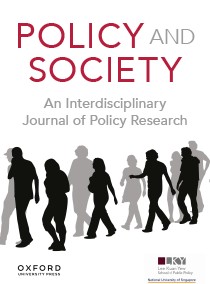Blame avoidance and credit-claiming dynamics in government policy communications: evidence from leadership tweets in four OECD countries during the 2020–2022 COVID-19 pandemic
IF 6.1
1区 社会学
Q1 POLITICAL SCIENCE
引用次数: 0
Abstract
Government information activities are often thought to be motivated by a classic calculus of blame minimization and credit maximization. However, the precise interactions of “blame” and “credit” communication activities in government are not well understood, and questions abound about how they are deployed in practice. This paper uses Natural Language Processing (NLP) machine-learning sentiment analysis of a unique dataset composed of several thousand tweets of high-level political leaders in four OECD countries—namely the Prime Ministers of the United Kingdom, Ireland, Australia, and Canada—during 2020–2022 to examine the relationships existing between “blame” and “credit” communication strategies and their relation to the changing severity of the COVID-19 pandemic, both in an objective and subjective sense. In general, the study suggests that during this high-impact, long-lasting, and waxing and waning crisis, political leaders acted in accordance with theoretical expectations when it came to communicating credit seeking messages during the periods when the COVID situation was thought to be improving, but they did not exclusively rely upon communicating blame or scapegoating when the situation was considered to be deteriorating. The consequences of this finding for blame and credit-based theories of government communication are then discussed.政府政策沟通中的责任回避和信用索取动态:来自2020-2022年COVID-19大流行期间四个经合组织国家领导人推文的证据
政府的信息活动通常被认为是由一个经典的责任最小化和信用最大化的计算所驱动的。然而,政府中“指责”和“信任”传播活动的确切相互作用尚未得到很好的理解,关于如何在实践中部署它们的问题比比皆是。本文使用自然语言处理(NLP)机器学习对一个独特的数据集进行情感分析,该数据集由四个经合组织国家(即英国、爱尔兰、澳大利亚和加拿大的总理)的数千条推文组成,在2020-2022年期间,从客观和主观的角度审视“指责”和“信任”沟通策略之间存在的关系,以及它们与COVID-19大流行严重程度变化的关系。总的来说,研究表明,在这场影响巨大、持续时间长、时断时续的危机中,政治领导人在传播寻求信贷的信息时,在人们认为新冠疫情正在好转的时期,按照理论预期行事,但在人们认为疫情正在恶化的时期,他们并不完全依赖于传播指责或找替罪羊。然后讨论了这一发现对指责和基于信用的政府沟通理论的影响。
本文章由计算机程序翻译,如有差异,请以英文原文为准。
求助全文
约1分钟内获得全文
求助全文
来源期刊

Policy and Society
Multiple-
CiteScore
18.00
自引率
6.50%
发文量
43
审稿时长
30 weeks
期刊介绍:
Policy and Society is a prominent international open-access journal publishing peer-reviewed research on critical issues in policy theory and practice across local, national, and international levels. The journal seeks to comprehend the origin, functioning, and implications of policies within broader political, social, and economic contexts. It publishes themed issues regularly and, starting in 2023, will also feature non-themed individual submissions.
 求助内容:
求助内容: 应助结果提醒方式:
应助结果提醒方式:


